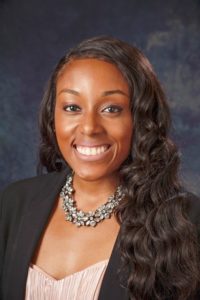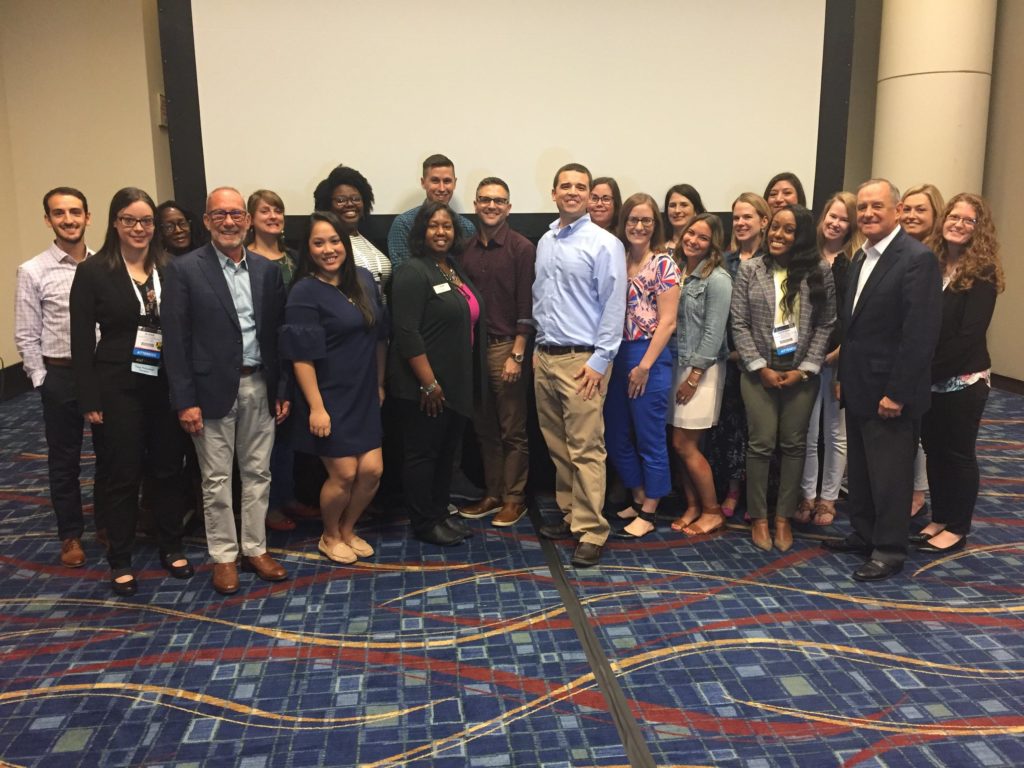Living in Purpose on Purpose as a Young Association Professional

Natasha Bethea began her career in fundraising for a direct marketing firm, but it didn’t take her long to realize she wanted to work with an organization that’s mission-based. Now the senior manager for membership at the Association for Psychological Science, Natasha manages the onboarding process for new members and has a hand in ensuring member communications, events and resources meet the professional education needs of more than 30,000 members worldwide.
She talked with Association Adviser about pursuing a masters’ degree while working full-time, how she strategizes for her career path, and the best career advice she would offer a fellow young association professional. Her life motto, “living in purpose on purpose,” motivates her to speak up about what the next generation needs to be successful and to empower other young professionals to eliminate fear and go after what they want.
Association Adviser: Tell us about your professional background. How did you end up at the Association for Psychological Science?
Natasha Bethea: Upon graduation from Howard University, I began my career as a fundraising consultant at a direct marketing firm. At that point in my life, I was not exactly sure of what I wanted to do in regards to my career, but I was confident that I would eventually figure it out. While working as a consultant, many of my clients were nonprofits and associations, and I immediately fell in love with working with organizations that were mission-based and all about making a difference to the audiences they serve. Through this work, I felt a true sense of fulfillment and I knew this was the industry I was meant to be in.
Following my time as a consultant, I began working at the American Nurses Association (ANA) where I performed membership and component relations duties. My job was to assist ANA’s state nurses associations with membership recruitment, retention, and engagement strategies. Working at ANA was so rewarding. I immersed myself in so much professional development and educational opportunities. I engaged in projects where I could be the lead and create impact. I got involved with professional associations including ASAE. Furthermore, I began to step outside of my comfort zone to become an active content leader and volunteer in the association community.
 All of this prepared me for the senior manager role at the Association for Psychological Science (APS). At APS, I lead the strategy, planning, and execution of all membership department activities. Working at APS has taught me a lot about leadership. I lead a team of incredible young professionals who inspire me daily. My goal is to lead by example, introduce them to growth opportunities, and push them to always step into their greatness. Making my team better is what gets me going each and every day.
All of this prepared me for the senior manager role at the Association for Psychological Science (APS). At APS, I lead the strategy, planning, and execution of all membership department activities. Working at APS has taught me a lot about leadership. I lead a team of incredible young professionals who inspire me daily. My goal is to lead by example, introduce them to growth opportunities, and push them to always step into their greatness. Making my team better is what gets me going each and every day.
AA: You’re also working on a master’s degree in nonprofit and association management. How are your studies informing your work at the moment?
NB: My graduate school studies have been extremely valuable in helping me to become the association executive I aspire to be. I have gained a wealth of knowledge relating to many aspects of running an association such as financial management, law and governance, crisis management, and marketing communications. School definitely informs my work in a big way. I am applying concepts from the classroom into my everyday work and it has made me a better problem-solver and a more strategic thinker.
I will admit balancing school with work is challenging at times but I am happy to say that I have maintained a 4.0 GPA throughout my graduate studies, and I plan to gain my Master’s degree this December.
AA: What advice would you give to other young association professionals considering graduate school?
NB: Timing is everything. Initially, I wanted to go straight to grad school after undergrad but I am so glad I chose not to. Honestly, I really did not know what I wanted to study or the career path I wanted to take. I believe getting some work experience in first really helped me choose the right program. Also, I am much more focused now than I was earlier in my career. Maturity and perseverance play a major role in grad school success.
There will be moments where you feel overwhelmed or that you just want to give up. However, having the willpower to keep going and prioritizing your time efficiently will go a long way.
AA: The Association for Psychological Science’s 30,000 members is a large group. How do you encourage individuals to stay engaged?
NB: APS definitely has a large membership which also includes a growing community of international members. Our membership is very diverse and consists of students, scientists, educators, and a host of leading researchers from around the world. Each group is motivated by different aspects of our membership and the challenge is always connecting them with what they find to be valuable. I believe APS does a great job of engaging our members at our annual convention. We have something for everyone there. We have events designed specifically for students, members interested in policy, members who teach psychology, and a wide array of other field-related areas spanning the full spectrum of psychological science. Membership is not a one-size-fits-all situation. You have to step into the shoes of your members, immersed yourself in their field, and do as much research as possible to find what they care about and want from your association.
AA: You oversee the onboarding process for new APS members. How do you ensure you’re meeting new members’ information expectations? How do you ensure they feel comfortable as they acclimate to their new membership?
NB: In order to ensure that we are meeting new members’ information expectations, I like to think about what I would want to see in an onboarding process. I belong to a few membership organizations so I definitely use my personal experiences to assist me in developing our onboarding strategy. Segmentation is so important. How we talk to our student members is different than how we talk to our members working in the field. We acknowledge that they are at two different points in their lives and we make sure to highlight benefits that specifically apply to them. I personally become disengaged when organizations speak to their members with one general message. As a young professional, I am going through a lot of different things than someone who may have been in their career 20+ years. It is important to pay attention to these differences.
Also, we like to take a personal approach and let members know that they can reach out to us with any questions and concerns that they have. Having an open door policy goes a long way and our executive director has done a phenomenal job at ensuring that members feel welcomed and heard.
AA: What responsibilities do you have regarding your department’s budget? How did you learn how to manage an association budget – in a class, on the job, through previous jobs? How can younger professionals gain the financial literacy skills needed to advance into senior leadership positions?
NB: In our budgeting process at APS, my boss and I meet to look back at past performance, suggestions from the board, and any the activities we have planned for the upcoming year. My boss makes sure that I am super involved and allows me to make recommendations for the upcoming budget year. Budgeting can be scary, but once you get over your fear and immerse yourself in the process you learn so much. I gained my budgeting knowledge from both school and work. In school, I enrolled in two financial management courses which have taught me a lot about accounting and budgeting when it comes to nonprofits and associations. I even had to create a few budgets in my classes based on sample data from other organizations. Usually, when I find an area of work that I am not necessarily comfortable in, I step outside of my comfort zone and engage more in that activity. Avoiding it won’t help, but leaning in to do the work will offer a unique professional development experience that will be totally worth it.
AA: What is the most important piece of advice you could offer for other young professionals beginning a career in association work?
NB: Find a mentor. It can be challenging, but not impossible, moving up in your association career when you are just getting started. So why not get some guidance from others who have been in your shoes. I believe much of my success today is due to the phenomenal mentors I have in my life. They give me the blueprint and I follow. Having a mentor will elevate your career quickly. They will help you to avoid mistakes they may have made in their career. They can give you feedback and recommendations on how you can strengthen your skills and build your personal brand.
Furthermore, mentors can act as sponsors and raise your profile by speaking on your behalf in your absence, introducing you to people who may be able to help you, and opening up doors that you may never had access to before.
Mentors are valuable and every professional should have one.
AA: Your motto is “living in purpose on purpose.” Tell us more about it.
NB: Living in purpose on purpose is all about identifying what’s most important to you and being intentional in making that your daily reality. I am passionate about helping young professionals rise above mediocrity, break glass ceilings, and embrace their greatness. In order to achieve this, I have to make sure I am speaking up about what the next generation needs to successful, challenging status quos, and providing resources and tips to empower them to eliminate fear and go after what they want. This motto can be applied to whatever sets your soul on fire. Figure out what your purpose is and spend everyday living it.

AA: What is your go-to networking tip?
NB: The thought of networking can be exciting to some and daunting to others. Although, current statistics show that 68 percent of entry-level professionals value face-to-face networking more than online, I still run into a few people who dread the thought of it. This is why I believe preparation is key. Before attending a networking event, you need to establish what your goals are. Out of all the events that you could have chosen to attend, why are you attending this one? Are you trying to find job opportunities? Are you looking for a mentor? Knowing why you are there will help you navigate the situation better and not waste time twiddling your thumbs but getting into action.
One of my favorite sayings is work until you no longer have to introduce yourself. As you grow in your career, it is crucial to get yourself out there and let people know who you are and what you bring to the table.
AA: If you had an extra 50 percent in your membership budget, what would you do with it?
NB: I would develop some webinars for our members. Online learning is huge and is becoming a more convenient way for people to gain the professional development and education they need. While meetings and conferences are still very much beneficial, they can be very expensive and time-consuming. In today’s society, we do almost everything online and in a digital setting. We bank online, order groceries online, and companies like Amazon make it easy for us to never leave the house to get what we need.
I know of many professionals who would rather spend 30 minutes learning about a particular subject through a webinar then taking the time out to attend in-person training. It is important to meet members where they are with what they need. Webinars and other e-learning platforms do exactly that.
AA: In terms of your job, what keeps you up at night?
NB: My excitement to be a game-changer keeps me up at night. Working in this industry is exciting. There are so many new trends and ways to do things. I usually have a ton of ideas running through my head at any given moment, so figuring out how to put these ideas into action and affect change at my organization is always on my mind. I want to be of value and be that person to constantly push the envelope on what is possible. This is why I believe it is important for associations to empower their young professionals. Challenge them. Task them with important projects. Let them take risks. You will be surprised to see what they are truly capable of once they get a chance to shine.

